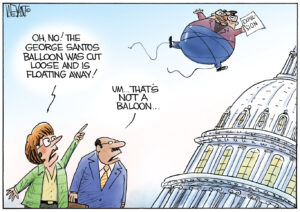‘Super Committee’ Fails to Overcome Republican Dogma
There are people on the right capable of arithmetic, but anyone who calls for revenue out loud is branded a heretic in Republican circles, where tax cuts are not a matter of policy but of faith.No, the sun didn’t rise in the west this morning. No, Republicans on the congressional “super committee” didn’t offer meaningful concessions on raising new tax revenue. And no, “both sides” are not equally responsible for the failure to compromise.
As usual, the two parties began with vastly different ideas of what it means to negotiate. Democrats envisioned meeting somewhere in the middle, while Republicans anticipated not moving an inch. This isn’t just my spin, it’s a matter of public record: Before the 12-member super committee ever met, House Speaker John Boehner warned that it had better not agree to any new tax revenue.
Think about this for a minute. The whole point of the subcommittee exercise was to begin reducing the ballooning national debt, now more than $15 trillion. Closing such a big gap with spending cuts is possible only in the parallel universe inhabited by GOP ideologues, a place where the laws of arithmetic do not apply.
Here in the real world — where tax receipts as a percentage of gross domestic product are lower than they’ve been since 1950 — it’s ridiculous to think of solving the long-term debt problem without substantial new revenue. Yet the position taken by Republicans in Congress is that tax rates can only go down, never up. To uphold this absolutist principle, they have gone so far as to threaten to send the U.S. Treasury into default.
That is basically where the subcommittee talks stood — Democrats ready to give and take, Republicans willing only to take — until the eleventh hour, when Sen. Patrick Toomey, R-Pa., presented to his supercolleagues a proposal for tax reform that some commentators hailed as a breakthrough. It was, in fact, nothing of the sort.
Toomey’s plan would actually cut tax rates, including for the wealthy, with a promise to raise them again if that’s what is needed to boost tax revenue by $250 billion over the next decade.
Puh-leeze.
While $250 billion sounds like a lot, it’s much less impressive when compared to the super committee’s overall goal of reducing the debt by $1.2 trillion. This would still mean four dollars in spending cuts for every one dollar of new revenue.
And Toomey’s number is a drop in the bucket when you look at the $15 trillion total debt — or even the $4 trillion in debt reduction that most analysts believe would really make a difference. With so little new revenue, we would need to make draconian cuts in Medicare, Medicaid and Social Security that would radically alter the social contract in this country.
Toomey’s proposal on taxes is a breakthrough only if we’re grading on a curve — giving Republicans extra credit for moving an inch, simply because they’ve been so adamant about not moving at all. Democrats, meanwhile, get accused of being intransigent for drawing a line after having moved many, many miles.
It’s useful to remember that not all Republicans are so stubborn. Many realize that a balanced approach of spending cuts and tax increases will be needed to address the debt problem — and that these adjustments shouldn’t be made too abruptly, given the fragility of the economic recovery. But anyone who speaks these truths out loud is branded a heretic in Republican circles, where tax cuts are not a matter of policy but of faith.
The deal that established the super committee specified that if the superlegislators failed to reach agreement, $1.2 trillion in budget cuts would automatically take place at the beginning of 2013. Is this really better, from the progressive point of view, than some sort of lopsided “compromise” incorporating the Toomey revenue, which would reduce the dollar amount of budget-slashing needed to attain the $1.2 trillion goal?
Yes, no deal is almost certainly better than a bad deal. The automatic cuts will be painful, but they don’t touch entitlements — and thus don’t pre-empt the serious discussion we need to have about making sure that Medicare, Medicaid and Social Security are sustainable.
Instead, the Pentagon bears the brunt of the sword-of-Damocles cuts. Already, Republicans are beginning to howl that we need to find some way to avoid damaging our national security. The solution is clear: If we want a military that projects American power around the globe, we need to pay for it.
Maybe Republicans will acknowledge that American greatness doesn’t come free. That’s the breakthrough we need.
Eugene Robinson’s e-mail address is eugenerobinson(at)washpost.com.
© 2011, Washington Post Writers Group
Your support matters…Independent journalism is under threat and overshadowed by heavily funded mainstream media.
You can help level the playing field. Become a member.
Your tax-deductible contribution keeps us digging beneath the headlines to give you thought-provoking, investigative reporting and analysis that unearths what's really happening- without compromise.
Give today to support our courageous, independent journalists.






You need to be a supporter to comment.
There are currently no responses to this article.
Be the first to respond.